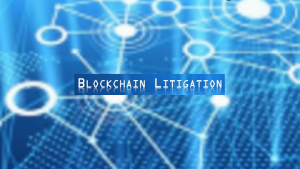

“As many companies are investing in or exploring innovative uses of blockchain, this Report helps quantify risk areas and provide a monitor for the litigation climate for blockchain along with current trends,” said Daniel Payne, a member of the firm’s FinTech & Blockchain Practice and architect of the firm’s Blockchain Litigation Database.
“There is no shortage of speculation on the potential of blockchain, and this report identifies potential pitfalls and red flags for those investing or sponsoring blockchain initiatives.”
The Blockchain litigation Report
According to the Report, based on data collected and analyzed from Murphy & McGonigle’s proprietary Blockchain Litigation database, five key trends emerged in 2019. Each merits attention from those operating in or considering the blockchain space:
- the Southern District of New York (SDNY) has more blockchain litigation than any where else
- the SEC remains Active with high profile enforcement activity
- regulatory enforcement actions have declined
- American courts have issued rulings which will affect the blockchain industry
- the SEC’s Path to Compliance is a ‘road less traveled.
After the SDNY with 54 cases in 2019, the SEC is the second most litigious source with less than half the number of cases (22). It is followed by SD Florida and ND Cal (both 19) and EDNY (15).
While the States took a step back, the SEC filed 43% more blockchain enforcement actions in 2019 (compared to 2018). These included three high-profile enforcement actions:
- Kik: in response to SEC demands that Kik shut down its token offering, Kik mounted a vigorous defense by going public with its Wells response, raising money for a robust legal defense and not considering settlement
- one: although Block.one paid one of the largest ICO settlement amounts to date ($24M), the settlement reflected only 0.6% of the $4B its ICO raised worldwide; Murphy & McGonigle says believe the company effectively settled the much smaller amount it raised in the U.S.
- Telegram: the SEC secured a TRO (Temporary Restraining Order) which blocked Telegram’s delivery of tokens to investors who had agreed to purchase them; the parties are now locked in litigation.
Rulings will affect the blockchain industry
Even when investors lose substantial cryptocurrency investments, courts are scrutinising fraud claims for allegations that satisfy heightened pleading standards. For example, the Courts:
- dismissed a claim of fraud against Coinbase in connection with the initial launch of trading in Bitcoin Cash; the Court found an alleged pump-and-dump scheme “implausible” [Berk v. Coinbase, Case No. 18-cv-1364, Dkt. No. 75 (N.D. Cal. Aug. 6, 2019)]
- found an Offering Memo with alleged misstatements was not “in connection with the sale of securities”; in this case the Court dismissed Section 10 claims [Garrison v. Ringgold et al., Case No. 19-cv-244, Dkt. No. 10 (S.D. Cal. May 13, 2019)]
Separately, courts may take a broad view of jurisdiction, pulling in crypto companies which operate largely outside the US:
- in a Martin Act investigation of Bitfinex, a New York state trial court found that the New York Attorney General (NYAG) has personal jurisdiction over Bitfinex, despite Bitfinex’s attempts to avoid New York (and U.S.) regulation [in re Ifinex et al., Case No. 450545/2019, Dkt. No. 115 (Sup. Ct. N.Y. Aug. 19, 2019)]
- a Court also permitted the NYAG to subpoena documents outside the US; it declined to answer whether Tether tokens are securities or commodities.
Traditional white papers and SAFT disclaimers may not be sufficient to defend against securities litigation. In one case the defendants argued that the plaintiff did not allege actionable misstatements under securities laws because:
- the white paper included cautionary disclosures, future-tense phrases, and mere puffery
- the SAFT included speculative language and a no-warranties clause.
The Court disagreed. It denied the motion to dismiss. [Merkamerica, Inc. v. Eiland Glover, et al., Case No. 19-cv-6111, Dkt. No. 29 (C.D. Cal. Dec. 3, 2019)]
The blockchain litigation database
Created in 2018 by Murphy & McGonigle’s Innovation Lab, the Blockchain Litigation database is a proprietary, data-based tool that monitors US litigation in the blockchain industry. The Blockchain Litigation database is the basis for analyses and interpretations appearing in the Blockchain Litigation Year in Review Report.
Murphy & McGonigle is a FinTech & Blockchain legal practice which advises clients on the legal and regulatory financial services regimes applicable to digital financial instruments, including those relating to:
- trading
- clearing
- custody of instruments.
Enterprise Times: what does this mean
For 2020 Murphy & McGonigle project the number of blockchain cases will continue to rise, perhaps even reaching 2018. This may occur even without a new wave of regulatory enforcement actions.
In the absence of new, clear guidance from the SEC or Congress, Murphy & McGonigle suggest that token issuers will be tempted to straddle the utility/security token path. The firm believes this risks enforcement actions.
In addition, many of the Cases filed in recent years will come to fruition. The probability is that these will deliver significant decisions in different jurisdictions. Many will likely conflict which could, per Murphy & McGonigle, lead to louder calls for increased legislative and regulatory guidance.

























